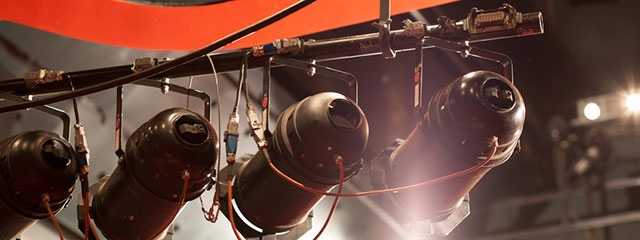Collaborative Learning as Part of the Production Process
The first show I sound designed was an immersive, multimedia staging of Through the Looking Glass and What Alice Found There. I had worked with the director, Courtney Price 09F, on a show she stage managed the previous year, as a sound board operator, which means I pressed “Go” when she told me to go. As a sound designer, I had no idea what I was doing, and spent just as much time learning how to make cue sheets, how to use Audacity (a free sound editing program absolutely not used by the professionals), and how to program cues as I did actually finding, editing, and recording sounds. I had to figure out how to get sound into the lobby, how to gracefully cut cues I didn’t want to cut, and how to get a single line near the end of the show to sound like it was coming from a fake pudding.
It was the best learning experience I could have gotten.
I’m now a Division III (senior) studying sound design, theater, music, audience, and writing. I didn’t come to college with a particular goal to study these disciplines. I enjoyed theater and music and had started to get into playwriting by the end of high school, but I wanted to study pretty much everything, so Hampshire’s theater program wasn’t what brought me here.
More than a “Theater Major”
Still, Hampshire’s theater program is pretty fantastic. We are certainly not the only college where writing, directing, managing, and design opportunities are available to students, but the opportunities here are staggering, and that’s not including all the productions at the other schools in the Five College consortium. Hampshire theater productions are produced, directed, designed, performed, and often written by students.
This enables students concentrating in theater to focus on learning skills in the context of a real production. In my mind, coursework is in support of this, rather than the other way around. I sound designed three shows before taking any classes in sound design, learning from the production process and an alumni mentor.
At Hampshire, you learn something by doing it. Of course, there is always someone you can go to for help or to talk about ideas – we have some great faculty and staff, and other students can also be a great resource. Hampshire’s academic program emphasizes an individual course of study, but theater is collaborative by necessity, and independent work becomes interdependent.
I don’t know if I will pursue theater after college, but think I’d like to continue working with sound, and I do want to work collaboratively in the way that I have at Hampshire. I know I have some solid skills in sound design, and I also know that I have much more to learn, and that the next time I don’t know how to do something, that’s an opportunity to do something new.






